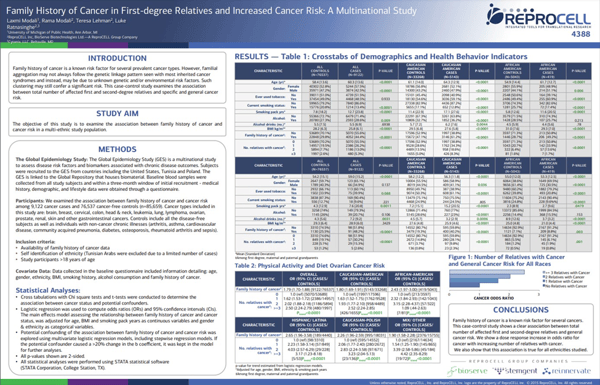In April 2015, the 106th annual meeting of the American Association for Cancer Research was held in Philadelphia, Pennsylvania. REPROCELL USA was in attendance and submitted a poster titled, Family History of Cancer in First-degree Relatives and Increased Cancer Risk: A Multinational Study.

Download this poster (PDF, 2.1mb).
The scope of this case-control study was to show a correlation between cancer risk and family history of cancer in a multi-ethnic population. Subjects were recruited from various countries including the United States, Tunisia, and Poland.
Cancer types studied included:
- Brain
- Breast
- Cervical
- Colon
- Head & Neck
- Leukemia
- Lung
- Lymphoma
- Ovarian
- Prostate
- Renal
- Skin
- Gastrointestinal
And control samples were collected from individuals who were disease-free or had a non-cancer illness including:
- Arthritis
- Asthma
- Cardiovascular disease
- Community acquired pneumonia
- Diabetes
- Osteoporosis
- Rheumatoid arthritis
- Sepsis
What is significant with this study is that it was layered with multiple variables. An analysis of multiple disease states, multiple generations, and multiple ethnic groups showed that across all ethnic groups, there was a higher risk of cancer associated with a family history where an increased number of first and second-degree relatives were affected by cancer.
Conducting a multi-variable study can be quite daunting, particularly when biomaterials need to be acquired or when subjects need to be recruited. REPROCELL can be a valuable resource in either scenario. When you reach out to REPROCELL, you can submit a request to search our biorepository which is stocked with a variety of biomaterials collected from a variety of subjects, each of which has over two hundred data points that include demographic data and clinical information. Additionally, we have the capability of datamining the samples. In the case of the poster above, we mined the data that was collected with each of the samples and determined the cancer risk. REPROCELL also has a great deal of experience working with clinical sites to conduct prospective custom collections to recruit the subjects and collect the samples that best fit your study based on established recruitment criteria.




.jpg?width=1000&height=562&name=Untitled%20design%20(10).jpg)



